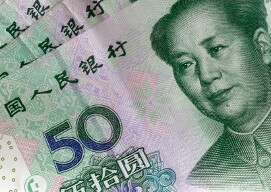The Chinese yuan weakened against the US dollar and a basket of currencies on Tuesday. Despite some modest gains in July, the currency is still hovering around a 13-month low, leaving many traders and world leaders wondering if Beijing is manipulating the yuan.
It has been several months since the US government applied hefty tariffs on tens of billions of dollars of Chinese goods. Although negotiators on both sides are optimistic they will come to a satisfying conclusion, President Donald Trump and his administration remain open to the idea of slapping levies on all Chinese exports. And the economy is beginning to feel the pain.
A plethora of official economic data is pointing to a downward trend for the remainder of 2018.
The official manufacturing purchasing managersâ index (PMI) slumped to a five-month low of 51.2, down from 51.5 in June. The subindex of the PMI fell to a 23-month low, but the export subindex remained relatively unchanged due to a weaker yuan.
Overall, official reports of factories and service providers are showing tumbling domestic demand. Because of this, many businesses are reducing production and investment: the subindex measuring production slipped to 53.0 from 53.6 and the new orders index dropped to 52.3 from 53.2. With the White House considering additional tariffs, national business sentiment is at its lowest in years.
Last week, it was reported that the Chinese government would be launching a stimulus program to spur economic growth. This includes increasing bank lending, issuing special bonds, slashing reserve requirement ratios, and boosting infrastructure spending. Analysts note that Beijingâs tepid growth is being capped by a depreciating currency.
Does this mean the Peopleâs Bank of China (PBOC) is purposely manipulating the yuan?
President Trump thinks so, tweeting that âChina, the European Union and others have been manipulating their currencies,â adding that they are âtaking away our big competitive edge.â
US Treasury Secretary Steven Mnuchin also noted last week that the US government, as well as other G7 partners, will be monitoring the yuan in the coming weeks to determine if unscrupulous practices are taking place.
However, the experts, including the International Monetary Fund (IMF) and Goldman Sachs, say that the yuan is âfairly valuedâ and that any depreciation in the currency stems from trade tensions, a sluggish economy, and diminishing domestic property market. With proposed state interventions that will inevitably drive up debt levels, the yuan could further slide when we enter 2019.
Real estate observers are projecting that international property investments could gain some momentum from wealthy Chinese investors. As part of their efforts to hedge risk of the yuanâs debasement, Chinese investors may target Canadaâs booming real estate market, including Toronto, Montreal, and Vancouver. In recent years, there have been concerns that foreign property owners are driving up the cost of homeownership, prompting local and provincial governments to impose a foreign buyers and speculation tax.
The USD/CNY currency pair rose 0.27% to 6.8331, from an opening of 6.815. The EUR/CNY currency pair advanced 0.33% to 8.0089, from an opening of 7.9776.
If you have any questions, comments or opinions regarding the Chinese Yuan,
feel free to post them using the commentary form below.

Chinese Yuan Depreciates As Economy Weakens, Manipulation Concerns Linger
More from NewsMore posts in News »


Be First to Comment